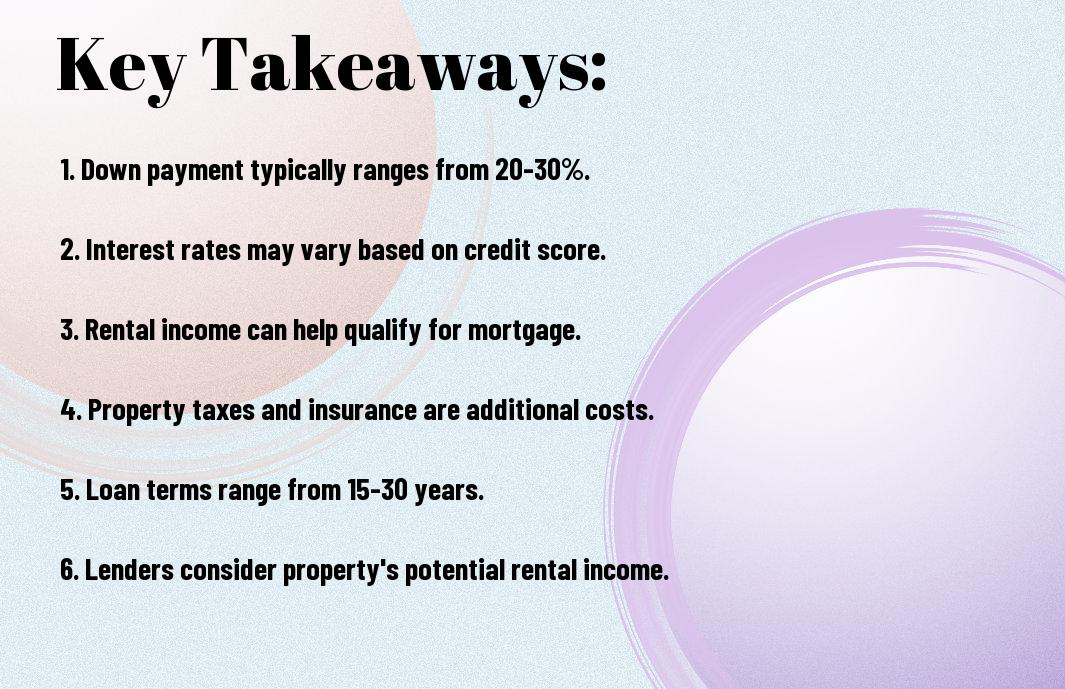Florida is a lucrative market for real estate investment, especially in rental properties. Understanding how rental property mortgages work in the Sunshine State is necessary for investors looking to capitalize on this opportunity. From the requirements and qualifications needed to secure a rental property mortgage to the potential risks and rewards associated with this type of investment, this guide will provide you with a comprehensive overview of the ins and outs of financing a rental property in Florida.
Key Takeaways:
- Rental Property Mortgages: Rental property mortgages in Florida work similarly to traditional mortgages, with lenders considering factors such as credit score, income, and property value.
- Higher Down Payments: Lenders typically require a higher down payment for rental property mortgages in Florida, usually ranging from 20% to 30% of the property’s purchase price.
- Potential Rental Income: Lenders may take potential rental income into account when approving a rental property mortgage in Florida, but it’s not always guaranteed and depends on the property’s rental history and market conditions.

Understanding Rental Property Mortgages
The Differences Between Residential and Rental Property Mortgages
It is crucial to understand the distinctions between residential and rental property mortgages when considering investing in rental properties in Florida. While residential mortgages are designed for primary residences, rental property mortgages are specifically tailored for properties that will generate rental income.
Assessing Your Eligibility for a Rental Property Mortgage in Florida
One important aspect of investing in rental properties in Florida is assessing your eligibility for a rental property mortgage. Lenders consider various factors such as credit score, debt-to-income ratio, rental income potential, and property value when determining eligibility.
A strong credit score and stable income are crucial for qualifying for a rental property mortgage in Florida. Lenders typically require a higher credit score and a lower debt-to-income ratio for rental property mortgages compared to residential mortgages. Additionally, having a clear plan for managing the property and demonstrating its income potential can strengthen your eligibility.
The Application Process for Rental Property Mortgages in Florida
Documents and Information Required
Keep in mind that when applying for a rental property mortgage in Florida, you will need to provide vital documents and information. This typically includes proof of income, credit history, tax returns, bank statements, and details about the property you intend to purchase. Having all the necessary paperwork ready will streamline the application process and increase your chances of approval.
Navigating through Florida’s Mortgage Regulations
Florida has specific mortgage regulations in place to protect both borrowers and lenders. When applying for a rental property mortgage in Florida, it is crucial to understand and comply with these regulations. One of the key regulations to be aware of is the state’s licensing requirements for mortgage brokers and lenders. Working with a licensed professional can help ensure that you are navigating the process successfully and in accordance with Florida law.
Application
When applying for a rental property mortgage in Florida, it is important to familiarize yourself with the state’s mortgage regulations to ensure a smooth and compliant process. Regulations
The Florida mortgage regulations are in place to safeguard the interests of all parties involved in the transaction. Compliance with these regulations is paramount to avoid any legal issues or complications down the line. By staying informed and working with reputable professionals, you can navigate through the mortgage application process in Florida with confidence.
Financing Options and Interest Rates
Exploring Different Mortgage Products in Florida
To secure a rental property mortgage in Florida, you have a range of financing options at your disposal. From conventional loans to government-backed FHA loans, each product comes with its own set of terms and conditions tailored to suit different investment strategies and financial profiles. It is crucial to evaluate the interest rates, down payment requirements, and repayment terms associated with each mortgage product before making a decision.
How Interest Rates and Loan Terms Vary for Rental Properties
One of the key factors that influence the cost of financing for rental properties in Florida is the interest rate attached to the loan. Interest rates for rental property mortgages are typically higher compared to primary residence loans, reflecting the increased risk for lenders. Additionally, loan terms may vary, with some lenders offering adjustable-rate mortgages (ARMs) with initial lower rates that later reset based on market conditions, while others provide fixed-rate mortgages with stable monthly payments throughout the loan term.
Different mortgage lenders in Florida may have varying eligibility criteria, down payment requirements, and fees associated with rental property loans. It is necessary to shop around and compare offers from multiple lenders to find the most competitive rates and terms that align with your investment goals. Additionally, maintaining a good credit score and a healthy financial profile can help you qualify for better loan terms and interest rates when financing a rental property in Florida.
Responsibilities and Considerations for Borrowers
Unlike traditional home mortgages, rental property mortgages come with their own set of responsibilities and considerations for borrowers in Florida. For a detailed guide on how to navigate the process of obtaining a loan for rental property investment in Florida, check out How to Get a Loan for Rental Property Investment in Florida.
Maintenance and Management of Mortgaged Rental Properties
With rental property mortgages in Florida, borrowers must consider the ongoing maintenance and management of the properties. It is crucial to factor in property upkeep, repairs, and finding suitable tenants to ensure a steady income stream and protect the asset’s value.
Tax Implications and Benefits for Florida Property Owners
Property owners in Florida need to be aware of the tax implications and benefits related to owning rental properties. Benefits such as deductions for mortgage interest, property taxes, and operating expenses can help reduce taxable income. It’s crucial to stay informed about tax laws and consult with a financial advisor to maximize the positive tax benefits while avoiding any dangerous pitfalls.
Conclusion
Conclusively, rental property mortgages in Florida operate similarly to traditional mortgages but with some key differences. Investors can secure financing for rental properties based on their creditworthiness, the property’s potential rental income, and the loan-to-value ratio. It is imperative for borrowers to understand the terms, interest rates, and repayment schedules to make informed decisions. Working with a reputable lender who specializes in rental property mortgages can help investors navigate the process efficiently and effectively. By following the guidelines and understanding the nuances of rental property mortgages in Florida, investors can build a successful real estate portfolio while maximizing their returns.
FAQ
Q: How do rental property mortgages work in Florida?
A: Rental property mortgages in Florida work in a similar fashion to traditional mortgages, with the key difference being that the property is intended to be rented out to tenants. Investors can secure a rental property mortgage from a lender, who will assess factors such as the property’s rental income potential, the investor’s creditworthiness, and the down payment amount. The investor then makes monthly payments to the lender, which often include not only the principal and interest but also property taxes and insurance. The income generated from renting out the property can help offset these costs and potentially generate additional income for the investor.
Q: What are the requirements for obtaining a rental property mortgage in Florida?
A: To obtain a rental property mortgage in Florida, investors typically need to meet certain requirements set by lenders. These requirements may include having a good credit score, typically above 620, providing proof of stable income, having a low debt-to-income ratio, and making a down payment of at least 15-25% of the property’s purchase price. Lenders may also consider the property’s potential rental income and its ability to cover the mortgage payments. It’s important for investors to have a strong financial profile and a solid business plan for renting out the property to increase their chances of qualifying for a rental property mortgage in Florida.
Q: What are some factors to consider when getting a rental property mortgage in Florida?
A: When getting a rental property mortgage in Florida, investors should consider several key factors. These include the location of the property, as certain areas may have higher rental demand and rental rates. Investors should also factor in additional expenses such as property taxes, insurance, maintenance costs, and property management fees when determining if the rental income will cover the mortgage payments. It’s important to research the local real estate market trends, vacancy rates, and rental regulations in Florida to make an informed decision. Additionally, investors should have a contingency plan in case the property remains vacant for an extended period or unexpected expenses arise.

